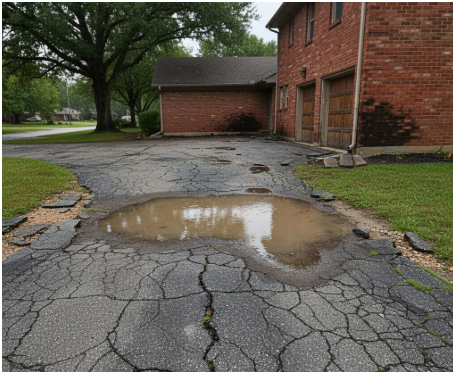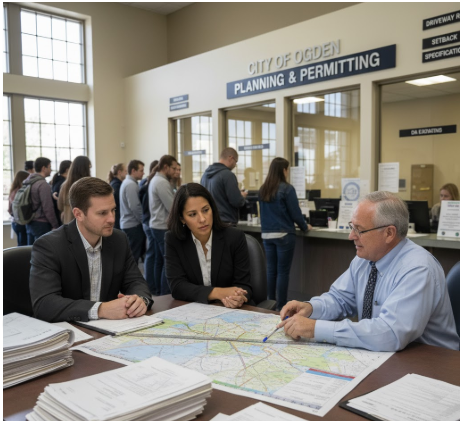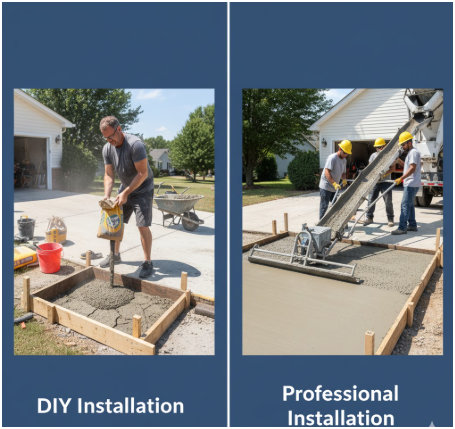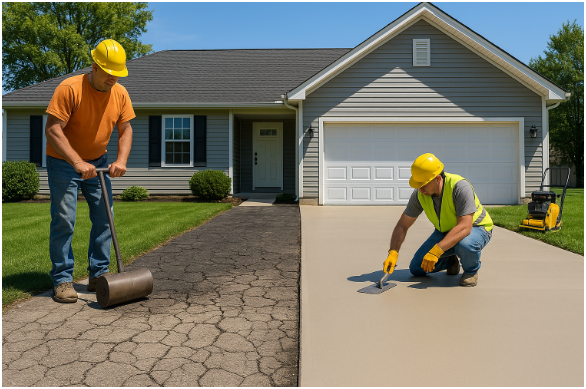Your driveway does more than just provide a place to park your car. It’s often the first thing visitors notice about your home, contributes significantly to your property’s curb appeal, and serves as a functional pathway that endures daily wear from vehicles and weather.
Signs You Need to Replace Your Driveway

Extensive Cracking and Crumbling
Small cracks in your driveway are normal and can often be repaired with sealant or patching compound. However, extensive cracking, especially large cracks wider than a quarter-inch or numerous interconnected cracks, typically indicates structural problems that go beyond surface-level fixes.
Crumbling edges and surfaces are another clear sign that replacement is necessary. When chunks of your driveway material are breaking away or the surface is becoming increasingly rough and uneven, repairs are usually just temporary solutions.
Drainage Problems
A properly installed driveway should direct water away from your home and garage. If you notice water pooling on your driveway after rain, or if water runs toward your foundation instead of away from it, your driveway may have settled unevenly or was improperly graded during installation.
Poor drainage doesn’t just affect your driveway’s longevity—it can lead to serious foundation issues and basement flooding. These problems often require a complete replacement with proper grading and drainage systems.
Age and Wear
Even well-maintained driveways have finite lifespans. Asphalt driveways typically last 15-20 years, while concrete can last 25-30 years with proper care. If your driveway is approaching or has exceeded these timeframes and showing multiple signs of wear, replacement is often more cost-effective than ongoing repairs.
Choosing the Right Material
Asphalt
Asphalt remains a popular choice for driveways due to its relatively low upfront cost and smooth appearance. It performs well in colder climates where freeze-thaw cycles are common, as it has some flexibility that helps prevent cracking.
However, asphalt requires regular maintenance, including sealing every 2-3 years and prompt attention to cracks and potholes. In hot climates, asphalt can become soft and may show tire marks or indentations from heavy vehicles.
Concrete
Concrete driveways offer excellent durability and can last decades with minimal maintenance. They perform particularly well in hot climates and can be customized with decorative finishes, colors, and patterns to enhance your home’s aesthetic appeal.
The main drawbacks of concrete include higher upfront costs and potential cracking in areas with significant freeze-thaw cycles. When concrete does crack, repairs can be more noticeable than asphalt patches.
Pavers
Brick, stone, or concrete pavers create an upscale appearance and offer excellent durability. Individual pavers can be replaced if damaged, making repairs less noticeable and more cost-effective than replacing entire sections of asphalt or concrete.
Pavers do require more maintenance in terms of keeping joints filled with sand and occasional re-leveling. They also typically represent the highest upfront investment among common driveway materials.
Gravel
Gravel driveways offer the lowest initial cost and work well for rural properties or longer driveways where other materials would be prohibitively expensive. They provide excellent drainage and can be relatively easy to maintain with periodic regrading and fresh gravel addition.
The downsides include ongoing maintenance needs, potential for ruts and potholes, and gravel migration that requires periodic replenishment and border maintenance.
Permits and Regulations

Before beginning any driveway replacement project, check with your local building department about permit requirements. Many municipalities require permits for driveway work, especially if you’re changing the size, location, or drainage patterns of your existing driveway.
Local regulations may dictate setback requirements from property lines, maximum driveway width, and drainage specifications. Some areas have restrictions on certain materials or require specific installation methods to prevent runoff issues.
If your driveway connects to a public street, you may need additional permits or inspections to ensure proper connection and compliance with municipal standards. Professional services for asphalt repair in Ogden, UT, and similar locations are typically familiar with local requirements and can help navigate the permit process.
Hiring a Contractor
Getting Multiple Quotes
Obtain detailed written quotes from at least three reputable contractors. These quotes should include material specifications, preparation work, labor costs, timeline, and warranty information. Be wary of quotes that seem significantly higher or lower than others, as they may indicate quality or scope differences.
Checking References and Credentials
Ask potential contractors for recent customer references and actually contact these references. Drive by recent projects if possible to see the quality of work firsthand. Verify that contractors are properly licensed for your area and carry adequate insurance coverage.
Insurance and Bonding
Ensure any contractor you hire carries both general liability insurance and workers’ compensation coverage. Request certificates of insurance and verify coverage directly with insurance companies. Bonding provides additional protection against contractor default or poor workmanship.
DIY vs. Professional Installation

DIY Considerations
Small driveway repairs or gravel driveway installation might be suitable DIY projects for experienced homeowners. However, proper driveway installation requires specialized equipment, knowledge of grading and drainage, and significant physical labor.
DIY installation may void material warranties and can result in costly mistakes if proper preparation and installation techniques aren’t followed. Consider your skill level, available time, and access to necessary equipment before deciding to tackle this project yourself.
Professional Benefits
Professional contractors bring experience, proper equipment, and warranties to your project. They understand local soil conditions, drainage requirements, and installation best practices that ensure long-term performance.
While professional installation costs more upfront, it often proves more economical over time when you factor in the likelihood of proper installation, warranty coverage, and compliance with local codes.
Cost Considerations

Material Costs
Material costs vary significantly by region and current market conditions. Generally, gravel is least expensive, followed by asphalt, concrete, and pavers. However, consider long-term costs including maintenance requirements when comparing options.
Labor and Preparation
Labor typically represents 50-70% of total project costs. Preparation work, including excavation, grading, and base material installation, significantly impacts both cost and long-term performance. Don’t compromise on proper preparation to save money upfront.
Additional Expenses
Factor in permit fees, potential utility line marking, disposal of old driveway material, and any necessary drainage improvements. If your project requires changes to existing landscaping or hardscaping, include these costs in your budget planning.
Maintenance Tips for Your New Driveway
Regular Cleaning and Inspection
Keep your new driveway clean of debris, oil stains, and ice-melting chemicals that can cause deterioration. Perform regular inspections to catch small issues before they become major problems.
Seasonal Maintenance
Seal asphalt driveways every 2-3 years and address cracks promptly. For concrete driveways, apply sealer every few years and keep expansion joints clear of debris. Paver driveways benefit from periodic sand replacement in joints and occasional re-leveling.
Proper Snow and Ice Management
Use appropriate snow removal tools and ice-melting products for your driveway material. Avoid metal shovels on delicate surfaces and excessive salt application that can cause damage over time.
Conclusion
Replacing your driveway is a significant investment that requires careful planning and decision-making. Start by honestly assessing your current driveway’s condition and your long-term needs.









